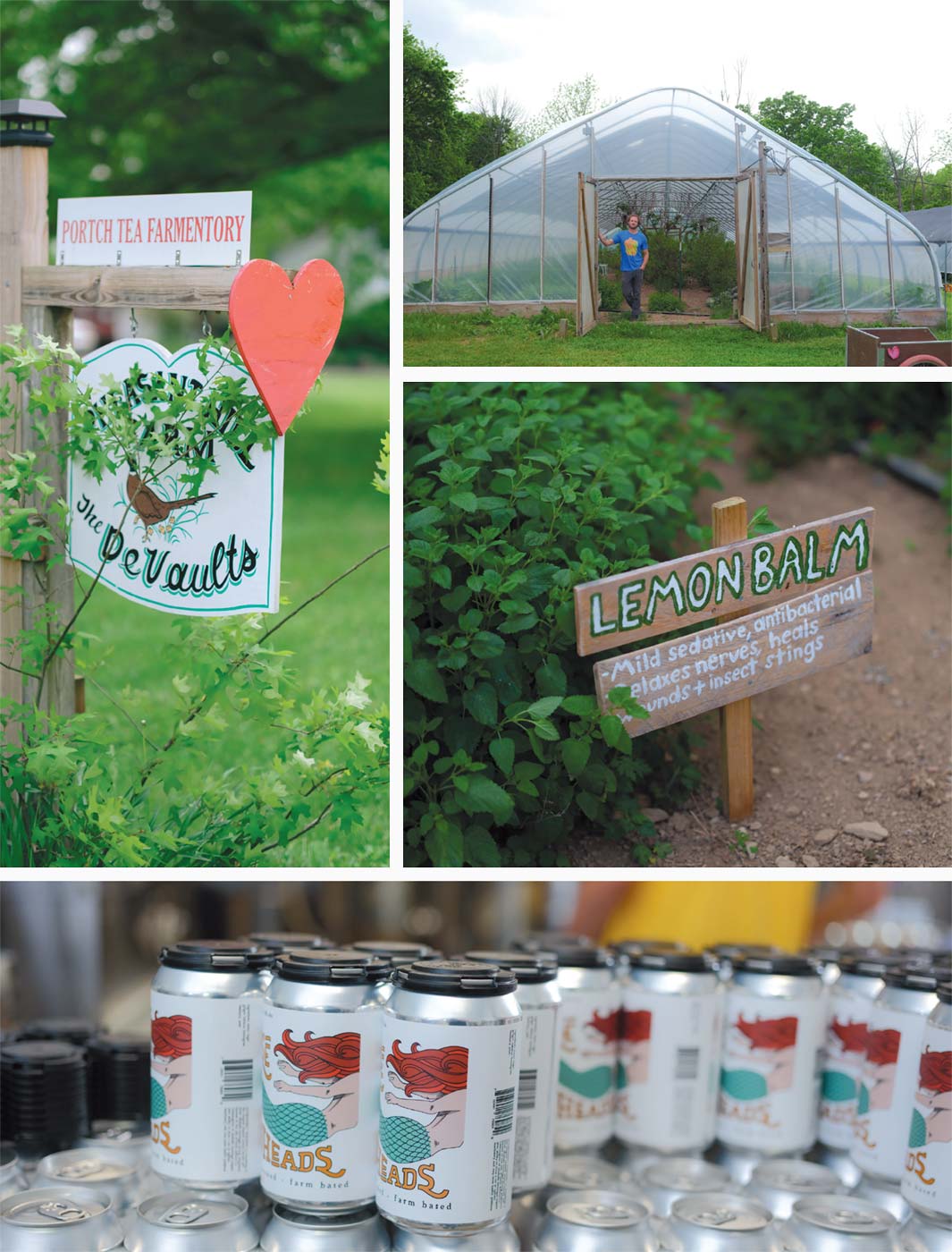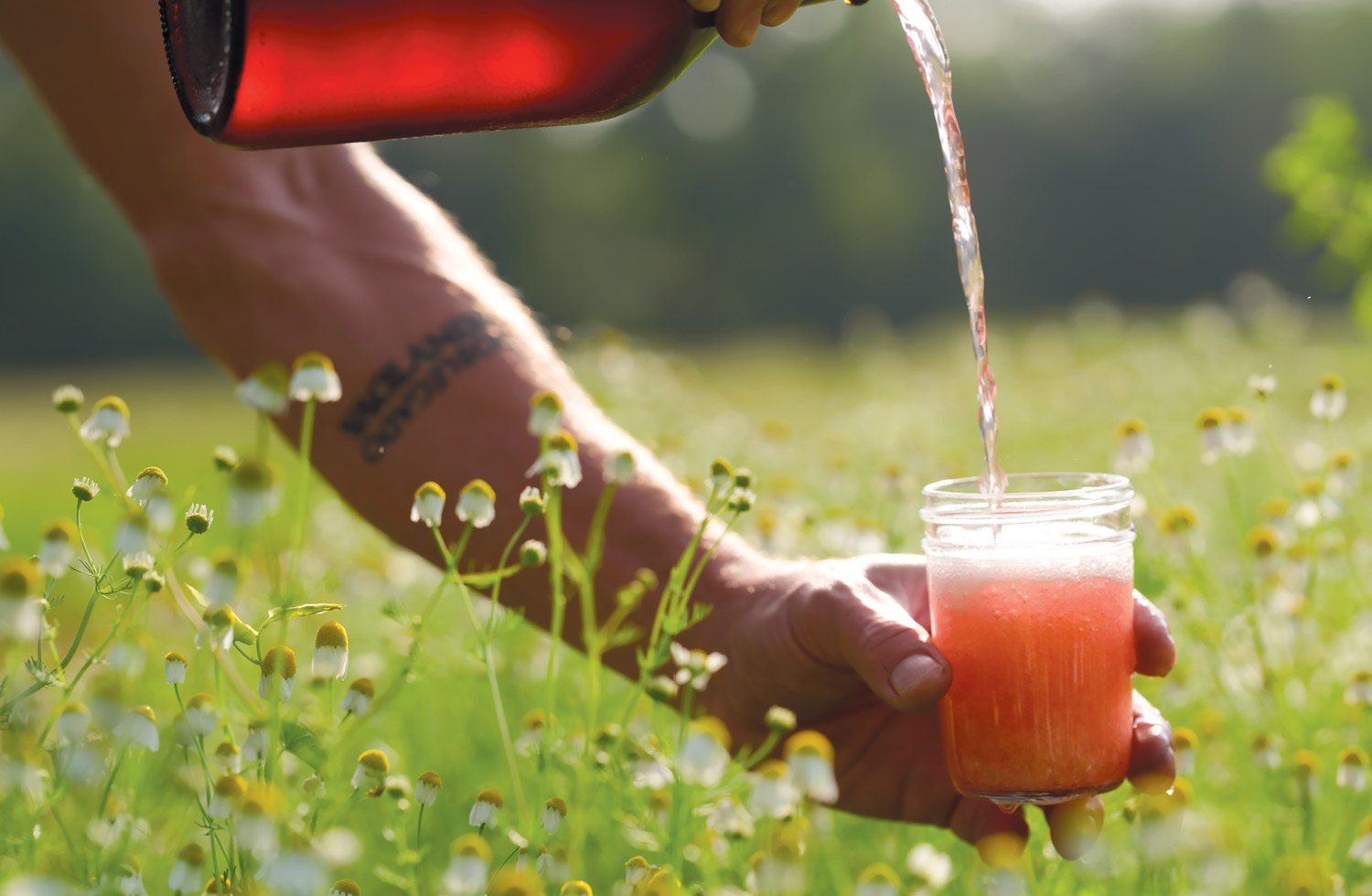Crafting Farm-to-Table Beverages Suits PorTch Tea to a T
MORE THAN 30 YEARS AGO, George and Melanie DeVault decided their earth-loving efforts as Rodale journalists would be better served by becoming farmers. And so they started Pheasant Hill Farm, so named for the abundance of wild pheasants on their 20 preserved acres in Emmaus, in Lehigh County. They grew gourmet mesclun mixes, ran CSAs, and were well known in the region as organic food pioneers and a community hub. They’d grow greens and flowers along with berries and veggies, some of them unique—ever had cucumber melons? Their son Don sold bagged fresh mesclun mixed greens out of coolers to Rodale employees at lunchtime.
Fast forward to the present day. Pheasant Hill is still a fully operating farm. The community aspect remains vibrant: yoga on the farm, gatherings on the PorTch (more on the spelling in a minute), and meandering the wildflower path that runs about “a country mile” around the property. Innovation has come in the form of growing ginger, turmeric, tulsi, chamomile, and all kinds of herbs, roots, and fruits, including elderberries and pawpaws; stone fruits come from Scholl Orchards. However, about three quarters of what they now grow doesn’t show up as salad in your bowl, but as fizzy kombucha in your glass.
We’re talking about farm-fresh booch, or, as the roadside sign leading to their property declares it, “a farmentory,” as kombucha is basically a sweet tea that’s fermented with a culture of bacteria and yeast.
The farm’s not certified organic but they’ve been growing that way: no chemical fertilizers, pesticides, or herbicides, not even the organic-approved ones.
As Don, now 45, puts it, “My folks were organic 30 years ago, before the federal standards. So I sort of feel like we’re grandfathered in.” The DeVaults’ heartfelt signage at farmers’ markets attests to this: “We don’t spray! We like you too much!”
After forays toward earning a PhD not once but twice and then bailing on academia altogether, Don spearheaded the launch of PorTch Tea kombucha in 2017, bringing the farm fully into the next generation (Don’s got an 8-year-old daughter, Lucía, too). He had spent time homesteading in Chile, where he grew and put together various herbal teas, infusions, and tisanes as nerve tonics and digestive aids, and it proved to be an inspiration for the next phase of Pheasant Hill: PorTch Tea. (The capital T reflects a misspelling on the architect’s original plans for the farm, and the porch’s penchant for bringing people together.)
It’s partly an effort toward diversifying the farm’s income, partly a way to use farm products in a healthy way, and partly a way to keep Don’s curiosity engaged.

Brewing kombucha was a natural move for Pheasant Hill Farm; it’s partly an effort toward diversifying the farm’s income, partly a way to use farm products in a healthy way, and partly a way to keep Don’s curiosity engaged. Flavors bear clever names, such as Nobody Expects the Spanish Inquisition (spiced elderberry); Until Morale Improves (a beet booch that riffs on pirate talk as in, “the beetings will continue”); When Life Gives You Lemons (lemon balm, lemongrass, rosemary, and lemon verbena); and Ricardo Mintlebaum (lemon balm and mint). And that’s just a select smattering.
These days, however, it’s not just kombucha. The farm acquired a limited winery license, but Covid slowed down the expansion of hard booch (restaurant shutdowns affected producers, too), and Don says he wasn’t going to do the next logical thing: scale up production of kombucha. It was time to diversify.
“I get bored once I’ve mastered something,” he says. “I want some new learning and challenges.” And that’s where growth takes place, especially in farming endeavors. More specifically, that challenge has taken the form of a ginger beer called Those Redheads. It’s pink-hued, refreshing, and a little zingy, and it clocks in around 5.8 percent ABV. “It works well in summer and is good for mixers, like in a Moscow Mule,” he says.
The most interesting part? The brewing setup is mobile, which means they can travel with it and it becomes a source of income by producing custom brews with partners such as distilleries (canned cocktails!), breweries, and organizations such as the Lehigh Valley Brewers Guild. The equipment was brand new during this story’s writing; troubleshooting involved floor drains and carbonation tweaks, showing that this new product provides the necessary learning curve needed to keep ideas bubbling and booch—and beer—brewing.
“Inertia will pull you in whatever direction you’re going, but you have to stop and look sometimes,” says Don, sounding a little like Yogi Berra. It’s easy to keep on doing what you’re doing, but the trick when you’re any kind of entrepreneur is to figure out what moves you. “You have to have access to that same spirit that got you going in the first place,” he says.
There’s plenty of spirit and ingenuity with PorTch Tea. Taste for yourself.
You can find PorTch Tea at farmers’ markets in Emmaus, Easton, Doylestown, and Lansdale. And, of course, on the farm itself.
PorTch Tea
3502 Main Rd. E., Emmaus
G and Facebook: @portchtea
portchtea.com





